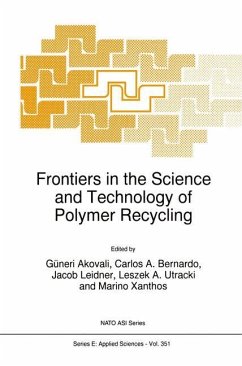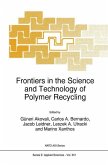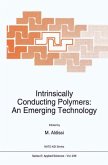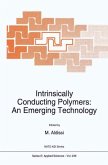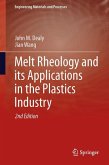Frontiers in the Science and Technology of Polymer Recycling
Herausgegeben:Akovali, Güneri; Bernardo, Carlos A.; Leidner, Jacob; Utracki, L. A.; Xanthos, Marino
Frontiers in the Science and Technology of Polymer Recycling
Herausgegeben:Akovali, Güneri; Bernardo, Carlos A.; Leidner, Jacob; Utracki, L. A.; Xanthos, Marino
- Broschiertes Buch
- Merkliste
- Auf die Merkliste
- Bewerten Bewerten
- Teilen
- Produkt teilen
- Produkterinnerung
- Produkterinnerung
Polymers, main components of plastics and rubbers, are being discarded in increasing quantities. But this waste can also be considered as `plastic gold'. Public concern, coupled with the inherent value of the material, means that recycling is imperative. The present book presents a survey of current knowledge in the form of case studies, including current legal and educational issues. Topics covered also include regulation and practice in NATO countries, the economics of recycling, the reprocessing of single polymers and mixtures, and future prospects and strategies. Audience: Vital reading for all polymer scientists, technicians and engineers.…mehr
Andere Kunden interessierten sich auch für
![Frontiers in the Science and Technology of Polymer Recycling Frontiers in the Science and Technology of Polymer Recycling]() Güneri Akovali / Carlos A. Bernardo / Jacob Leidner / L.A. Utracki / Marino Xanthos (eds.)Frontiers in the Science and Technology of Polymer Recycling153,99 €
Güneri Akovali / Carlos A. Bernardo / Jacob Leidner / L.A. Utracki / Marino Xanthos (eds.)Frontiers in the Science and Technology of Polymer Recycling153,99 €![Intrinsically Conducting Polymers: An Emerging Technology Intrinsically Conducting Polymers: An Emerging Technology]() M. Aldissi (Hrsg.)Intrinsically Conducting Polymers: An Emerging Technology115,99 €
M. Aldissi (Hrsg.)Intrinsically Conducting Polymers: An Emerging Technology115,99 €![Intrinsically Conducting Polymers: An Emerging Technology Intrinsically Conducting Polymers: An Emerging Technology]() Intrinsically Conducting Polymers: An Emerging Technology115,99 €
Intrinsically Conducting Polymers: An Emerging Technology115,99 €![Surfactant Aggregation Surfactant Aggregation]() J. H. ClintSurfactant Aggregation39,99 €
J. H. ClintSurfactant Aggregation39,99 €![Introduction to Thermal Analysis Introduction to Thermal Analysis]() M.E. BrownIntroduction to Thermal Analysis176,99 €
M.E. BrownIntroduction to Thermal Analysis176,99 €![Melt Rheology and its Applications in the Plastics Industry Melt Rheology and its Applications in the Plastics Industry]() John M DealyMelt Rheology and its Applications in the Plastics Industry136,99 €
John M DealyMelt Rheology and its Applications in the Plastics Industry136,99 €![A Little Book about BIG Chemistry A Little Book about BIG Chemistry]() Jim MassyA Little Book about BIG Chemistry42,99 €
Jim MassyA Little Book about BIG Chemistry42,99 €-
-
-
Polymers, main components of plastics and rubbers, are being discarded in increasing quantities. But this waste can also be considered as `plastic gold'. Public concern, coupled with the inherent value of the material, means that recycling is imperative. The present book presents a survey of current knowledge in the form of case studies, including current legal and educational issues. Topics covered also include regulation and practice in NATO countries, the economics of recycling, the reprocessing of single polymers and mixtures, and future prospects and strategies.
Audience: Vital reading for all polymer scientists, technicians and engineers.
Audience: Vital reading for all polymer scientists, technicians and engineers.
Produktdetails
- Produktdetails
- Nato Science Series E: 351
- Verlag: Springer / Springer Netherlands
- Artikelnr. des Verlages: 978-90-481-5074-8
- Seitenzahl: 504
- Erscheinungstermin: 3. Dezember 2010
- Englisch
- Abmessung: 235mm x 155mm x 28mm
- Gewicht: 756g
- ISBN-13: 9789048150748
- ISBN-10: 9048150744
- Artikelnr.: 32094913
- Herstellerkennzeichnung
- Springer-Verlag GmbH
- Tiergartenstr. 17
- 69121 Heidelberg
- ProductSafety@springernature.com
- Nato Science Series E: 351
- Verlag: Springer / Springer Netherlands
- Artikelnr. des Verlages: 978-90-481-5074-8
- Seitenzahl: 504
- Erscheinungstermin: 3. Dezember 2010
- Englisch
- Abmessung: 235mm x 155mm x 28mm
- Gewicht: 756g
- ISBN-13: 9789048150748
- ISBN-10: 9048150744
- Artikelnr.: 32094913
- Herstellerkennzeichnung
- Springer-Verlag GmbH
- Tiergartenstr. 17
- 69121 Heidelberg
- ProductSafety@springernature.com
Marino Xanthos is Professor of Chemical Engineering and Director of the Polymer Engineering Center of the New Jersey Institute of Technology since 1995. He studied chemical engineering at the University of Toronto, where he took his Ph.D. degree in 1974. He then became Manager of R & D and Technical Services at Marietta Resources International Ltd. in 1975 and taught at the Stevens Institute of Technology, Hoboken, from 1980 to 1995. Since 1988, he has also been Director of Research at the Polymer Processing Institute (PPI), Newark, NJ, an independent non-profit research organization located at NJIT.
His interests focus on polymer blends, composites, and foams, polymer modification and reactive processing, plastics recycling and life-cycle assessment, structure-property relationships, environmental considerations in polymer processing.
His interests focus on polymer blends, composites, and foams, polymer modification and reactive processing, plastics recycling and life-cycle assessment, structure-property relationships, environmental considerations in polymer processing.
1. Introduction.- to Recycling.- Regulations and Practices of Polymer Recycling in NATO Countries (A). European Countries.- Regulations and Practices of Polymer Recycling in NATO Countries (B). Canada and United States of America.- Economic Aspects of Plastics Recycling.- Polymer Recycling for Energy Recovery An Application of Life Cycle Analysis Principles.- 2. Fundamental Issues Pertinent to Polymer Recycling.- Upgrading of Recyclates - the Solution for High Value Applications: Restabilization and Repair.- Biodegradable Materials: State of Art and Future Perspectives.- Polymer Blends' Technology for Plastics Recycling.- Compatibilization of Heterogeneous Polymer Mixtures from the Plastics Waste Streams.- Morphology Development During Processing of Recycled Polymers.- 3. Reprocessing of Single Type Polymers.- Derivation and Validation of Models to Predict the Properties of Mixtures of Virgin and Recycled Polymers.- Reprocessing of Poly (Vinyl chloride), Polycarbonate and Polyethyleneterepthalate.- Reprocessing of Polyolefins: Changes in Rheology and Reprocessing Case Studies.- 4. Reprocessing of Mixture of Polymers.- Separation Technologies.- Reprocessing of Commingled Polymers and Recycling of Polymer Blends.- Non-Convential Processing Techniques for Polymer Recycling.- Reprocessing and Properties of Homopolymer Blends of Virgin and Recycled Polymers.- 5. Recovery of Chemicals and Energy.- PVC Recycling with Chlorine Recovery.- Thermolytic Processes.- Solvolysis.- Fluidized Bed Incinerator with Energy Recovery System as a Means of Plastic Recycling.- 6. The Way Forward.- Future Perspectives and Strategies of Polymer Recycling.- General Discussion - the Participants' view.
1. Introduction.- to Recycling.- Regulations and Practices of Polymer Recycling in NATO Countries (A). European Countries.- Regulations and Practices of Polymer Recycling in NATO Countries (B). Canada and United States of America.- Economic Aspects of Plastics Recycling.- Polymer Recycling for Energy Recovery An Application of Life Cycle Analysis Principles.- 2. Fundamental Issues Pertinent to Polymer Recycling.- Upgrading of Recyclates - the Solution for High Value Applications: Restabilization and Repair.- Biodegradable Materials: State of Art and Future Perspectives.- Polymer Blends' Technology for Plastics Recycling.- Compatibilization of Heterogeneous Polymer Mixtures from the Plastics Waste Streams.- Morphology Development During Processing of Recycled Polymers.- 3. Reprocessing of Single Type Polymers.- Derivation and Validation of Models to Predict the Properties of Mixtures of Virgin and Recycled Polymers.- Reprocessing of Poly (Vinyl chloride), Polycarbonate and Polyethyleneterepthalate.- Reprocessing of Polyolefins: Changes in Rheology and Reprocessing Case Studies.- 4. Reprocessing of Mixture of Polymers.- Separation Technologies.- Reprocessing of Commingled Polymers and Recycling of Polymer Blends.- Non-Convential Processing Techniques for Polymer Recycling.- Reprocessing and Properties of Homopolymer Blends of Virgin and Recycled Polymers.- 5. Recovery of Chemicals and Energy.- PVC Recycling with Chlorine Recovery.- Thermolytic Processes.- Solvolysis.- Fluidized Bed Incinerator with Energy Recovery System as a Means of Plastic Recycling.- 6. The Way Forward.- Future Perspectives and Strategies of Polymer Recycling.- General Discussion - the Participants' view.

